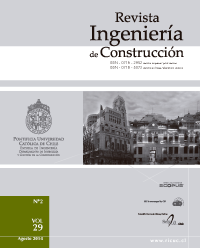Modeling a bending resistance modulus for a cementitious material compound based on properties in fresh state
DOI:
https://doi.org/10.4067/S0718-50732014000100008Keywords:
Corrugated tiles, regression models, laminated composite, module flexural strengthAbstract
In this research we studied the relationship between fresh state and hardened state of a fiber reinforced laminate compound (MCLRF), respectively, based on a matrix of Portland cement. The variables that have been worked in the fresh state were undulation ability, flow ability and drain ability and hardened in the form of resistance to bending, (bending resistance modulus). The samples were prepared with different raw materials (fique fiber, bentonite, pulp, silica fume, and Acronal). The ingredients were grinded by a mixer working at a constant speed, after that, the mixture was poured into a drainage chamber, and the water was extracted, forming a sheet with dimensions 130x50x6 mm, finally, it was immersed in a curing chamber for 28 days, for bending evaluation. The linear regression model proposed to predict the bending resistance modulus, considering the properties of in fresh state, was performed through the analysis of interactions between variables in formulation of the mixture used. From the regression model it was found that there is a clear correlation between bending resistance modulus and the predictive variables: undulation ability, flow ability and drain ability. Furthermore, the variables have a negative effect on the bending resistance modulus


